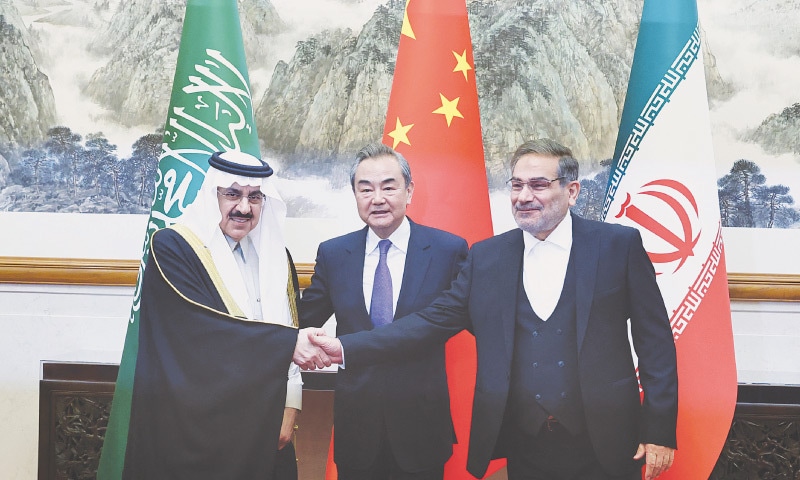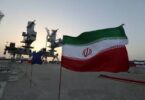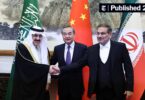Recently, Iran and Saudi Arabia have agreed to re-establish ties and reopen embassies within two months. According to the media, the most important development came after Ali Shamkhanin, Iranian General and Secretary to Iran’s powerful Supreme National Security Council met with Saudi National Security Advisor, Musaad Bin Mohammed Al- Aiban in Beijing on Friday. The two sides agreed to resume the 2001 security cooperation agreement and promised to boost their bilateral cooperation, respect state sovereignty, and not interfere in each other’s domestic affairs. During the joint statement, Saudi and Iranian representatives termed their discussions transparent and constructive while the Chinese Foreign Minister hailed Saudi and Iranian wisdom for seizing this opportunity to revitalize peace and progress in the Middle Eastern region.
The two prominent and influential Muslim nations, Iran and Saudi Arabia, had remained at odds for decades, with fractured diplomatic and political relations, while their mutual tussle generally undermined the unity, trade, and Security cooperation among the Muslim countries in the region and beyond. Historically, Saudi Arabia preached its Sunni Wehabi doctrine while multiple Muslim nations including Yemen, Lebanon, Syria, Pakistan, Afghanistan, and Bahrain, remained victims of Iran-backed Shia proxies in the past. The Saudi-Iran rivalry that commenced after the Iran Islamic revolution in 1979, could never be settled permanently but rather a moderate or mild hostility often persists between the two contenders over the past four decades.
The recent Ryidh-Tehran diplomatic breakoff took place after Saudi Arabia executed prominent firebrand Shia cleric Sheikh Nimr Baqir Al-Nimr in 2016, which flared up massive public condemnation in Iran and a furious mob invaded Saudi Embassy in Tehran. Meanwhile, simmering escalation in Yemen and Houthis’ incessant missile attacks on the Kingdom further fueled the tension between the Saudia-led Arab coalition and Iran in the past years. At the peak of the Saudi-Iran rivalry, the Biden administration launched a campaign for Israel’s regional integration and an Arab-Israel Alliance against Tehran but Biden’s initiative was tactfully neutralized by China through the recent Arab-Persia accord.
Interestingly, the American and Israeli dream for an anti-Iran Arab Alliance collapsed when the Chinese brokered Saudi-Iran rapprochement deal was struck in Beijing on Friday. The years-long endeavor initiated by the former Iraqi Prime Minister, Mustafa Al-Kadhimi, once facilitated by the State of Oman finally landed its destination through the successful lobbying of the Chinese government in the past months. The Chinese role made this regional alignment more important while the strategic nature of this move is likely to redraw a new map of regional friends and foes along with their global henchmen including the United States, NATO, Russia, and China. In fact, Saudi-Iran rapprochement would lead to Iran’s integration into the broader Middle East and North African region through bilateral agreements with Saudi allies such as UAE, Egypt, Kuwait, Morroco, and others. Apparently, those positive sentiments will pave the way for a peaceful settlement of the longstanding conflicts in Yemen, Lebanon, and Syria along with a broader interfaith harmony and economic cooperation in the entire Muslim world.
Realistically, the Muslim world had paid a heavy price for the Saudi-Iran rivalry, as a majority of Muslim nations from East Asia to Western Africa remained victims of sectarian violence, clerics’ hegemonism, political instability, and foreign intervention throughout history. Now, positive momentum has begun that needs the continuation of policies, political resilience, and a quest for peaceful co-existence, that will ultimately lead to a better future for Muslim Ummah across the world.







